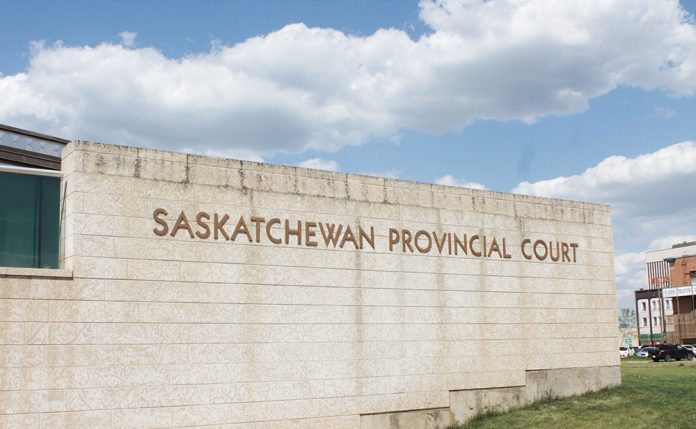A Prince Albert courtroom became a window into a local “dial-a-dope” operation, as an Edmonton man went on trial Tuesday.
Antonio Crane was found guilty of possession for the purpose of trafficking and possession of the proceeds of crime on Tuesday. He was charged this April, after police found him in a hotel room with a stash of crack cocaine, a large number of $20 bills and an admitted drug dealer.
That drug dealer, Levi Huggins, pleaded guilty to trafficking charges Friday. In Tuesday’s trial, he took the stand to defend Crane, saying his friend had no involvement in his drug trafficking business.
Unlike Huggins, Crane didn’t have any drugs on his person when police burst into their room. But police found him with $810 in cash and a flip phone filled with suspicious messages.
Crown prosecutor Brent Slobodian called several of those officers to the stand. All seasoned drug investigators, they said they first got word that three men were dealing drugs out of the Quality Inn downtown on April 27. Two of those men, they heard, had face tattoos.
Crane has dark tattoos covering about a quarter of his facial surface.
The police set up surveillance in a parking lot by the hotel. They saw at least two men coming in and out of the hotel to approach cars, chatting with their occupants for brief periods. One officer said he saw the men get into a van, where a woman handed about $40 to a man he said matched Crane’s description.
They soon got a search warrant and barged into the hotel room using a battering ram. They arrested all three men and seized about eight grams of crack cocaine, packaged in individual baggies, and a small quantity of methamphetamine. They also found several cellphones.
An RCMP drug expert, Constable Adam Gauthier, said that matches what he called a “dial-a-dope operation,” where small-scale dealers pass around a cell phone already hooked into a drug network.
“The amounts aren’t staggering,” he said. “That’s the most common street-level that I see, a dial-a-dope operation.”
Gauthier noted that one of the phones found in the hotel room – an LG flip phone – contained several messages suggestive of drug trafficking. One of the messages mentions a “ball,” which he said stands for an eighth ounce of cocaine. Several people also sent texts asking for “pieces.” That, he explains, is street lingo for somewhat less than a half gram of cocaine.
That LG phone turned up on Crane, along with the cash. But Huggins and Crane both had an excuse for how it found its way into his pocket. They said Crane borrowed the phone from his Huggins – who, again, readily admits to selling drugs – in order to call his “baby momma.”
That was only minutes before police stormed through the door, Huggins told the court.
He said Crane had absolutely no involvement in his drug operation. He denied that he ever sent his friend out to sell or deliver drugs. They were just “hanging out.”
Crane’s lawyer, Dale Blenner-Hassett, asked Huggins why he wanted to testify.
“To tell the truth,” Huggins said. “Someone is in jail because of my actions. I feel guilty about it.”
Slobodian then stood up to cross examine Huggins. He first tried to pin down the exact amount of drugs Huggins brought to Prince Albert when he arrived the day before: about 14 grams.
Slobodian began to spin a trap. He asked how much Huggins sold his “pieces” for. About $50, Huggins told him. He asked him what he spent the money on. Huggins said he used it all on liquor, smokes and methamphetamine.
“I was spending it faster than I was making it,” Huggins said.
That would imply he spent several hundred dollars that night. The subtext, of course, was that some of the money ended up on Crane, since neither of the other men had cash on their persons.
Then Slobodian asked Huggins about the third man, Jamie Hunt, who took off after getting released on bail. He is still at large. The prosecutor asked Huggins whether Hunt was part of his drug dealing operation.
Huggins looked uncomfortable, biting his lip and then breaking out in a laugh. He didn’t want to squeal on his associate.
“That’s very common,” Slobodian said, striking at the heart of the witness’s credibility. “Don’t want to name names, correct?”
“Yup.”
“Don’t want to be a snitch.”
Crane’s lawyer, Dale Blenner-Hassett, then called his own client to the stand. Crane said he wasn’t dealing drugs, but only using them. And he had an explanation for how he ended up in the van where police spotted him. He said he was buying marijuana.
He also said that he didn’t really ask questions about what Huggins was doing constantly taking messages and leaving the hotel room.
“Did you become suspicious that maybe he was selling drugs?” Blenner-Hassett asked his client.
“I wasn’t really thinking about it,” Crane said.
As for the $810, he said it came from Alberta’s social assistance program, and from his grandma.
Crane also took issue with the police officer’s testimony. He said he wasn’t dressed like the man they saw walking up to those cars. He pointed out that they would have spotted his extensive facial tattoos if it was really him.
The defence rested their case after Crane’s testimony. Slobodian and Blenner-Hassed then argued their case before the judge, S. Shiefner, who gave his guilty verdict that day.
“The judge did not believe the testimony of either the accused Crane, or the witness Huggins,” Blenner-Hassett told the Daily Herald.
He said it was an “uphill battle” representing an accused found in a hotel room with drug traffickers, cash and a suspicious phone.


